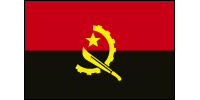| Country (long form) |
Republic of Angola |
| Capital |
Luanda |
| Total Area |
481,353.56 sq mi
1,246,700.00 sq km
(slightly less than twice the size of Texas) |
| Population |
10,366,031 (July 2001 est.) |
| Estimated Population in 2050 |
25,190,762 |
| Languages |
Portuguese (official), Bantu and other African languages |
| Literacy |
42.0% total, 56.0% male, 28% female (1998 est.) |
| Religions |
indigenous beliefs 47%, Roman Catholic 38%, Protestant 15% (1998 est.) |
| Life Expectancy |
37.36 male, 39.87 female (2001 est.) |
| Government Type |
transitional government, nominally a multiparty democracy with a strong presidential system |
| Currency |
1 kwanza (NKz) = 100 lwei |
| GDP (per capita) |
$1,000 (2000 est.) |
| Industry |
petroleum; diamonds, iron ore, phosphates, feldspar, bauxite, uranium, and gold; cement; basic metal products; fish processing; food processing; brewing; tobacco products; sugar; textiles |
| Agriculture |
bananas, sugarcane, coffee, sisal, corn, cotton, manioc (tapioca), tobacco, vegetables, plantains; livestock; forest products; fish |
| Arable Land |
2% |
| Minerals and Resources |
petroleum, diamonds, iron ore, phosphates, copper, feldspar, gold, bauxite, uranium |
|


|